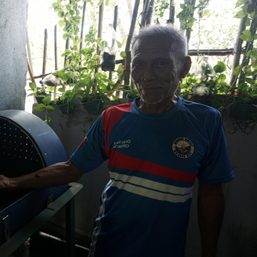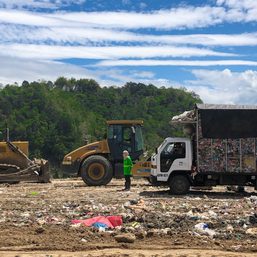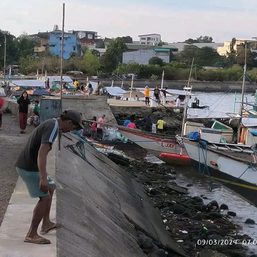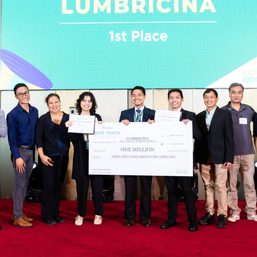SUMMARY
This is AI generated summarization, which may have errors. For context, always refer to the full article.

It is hard to urge people to reduce and reuse when safety is of utmost priority, and plastic has become a go-to source of protection.
A lot of people do not realize the additional waste we’ve been disposing amid the COVID-19 pandemic – from masks to face shields to plastic for home deliveries, the amount of trash generated by community quarantines has upped the plastic pollution globally.
According to the American Association for the Advancement of Science (AAAS): “If the global population adheres to a standard of one disposable face mask per day after lockdowns end, the pandemic could result in a monthly global consumption and waste of 129 billion face masks and 65 billion gloves.”
In the Philippines, though, some social enterprises are working hard to forge new paths toward sustainability.
Breaking the cycle
When you think sustainability, it often involves a conscious preparation before any purchase. It usually entails preparing a to-go bag, bringing clean utensils, or refilling a water jug beforehand.
However, these need not only be the way we practice sustainability.
In 2015, a whopping 61% of products in the market are encased in plastic packaging, mostly from personal care items, according to Lisa Pierce of Packaging Digest.
Here in the Philippines, different brands have been fighting to break this cycle of waste by creating innovative products that will satisfy Filipinos’ needs minus the toll on the environment.
NANU, short for Nature’s Nutrients, is a local beauty brand that flaunts its line of clean personal care products. These products are formulated to be natural and organic, paraben-free, cruelty-free, sulfate-free, and vegan.
However, something that sets NANU apart from other clean beauty brands is its bottle return service, a first in the Philippines.
This means once you’ve purchased and finished a bottle, on your next order, you can unlock a free shipping voucher if you return the previous bottle. The old bottle then goes through an FDA approved sanitation process to make sure your bottles are clean and ready to go back into the market.
All of NANU’s products come in recyclable aluminum bottles with completely plastic-free packaging. Bottle pumps also come in as an optional, standalone purchase.
“We wanted to challenge the way things are being done,” said one of NANU’s co-founders, Miggy Silva.
While limiting single-use plastic – and, in turn, lessening plastic pollution – NANU is also easy on the wallet. All their bottles cost P449 for a 500ml bottle of any of their products, which is relatively cheaper than bigger drugstore competitors.
This is possible because of NANU’s 100% e-commerce direct-business model – going straight from their warehouses to their clients’ doorstep and back.
Revolutionary
Another company that has been supporting sustainable causes is the Sinaya Cup, the first local menstrual cup brand in the Philippines. In 2015, Sinaya introduced the first reusable feminine hygiene product to Filipinos, bringing a new form of period collection in a convenient and accessible manner.
Audrey Tangonan, Sinaya’s founder, started the company because of her interest in eco-friendly items. She discovered menstrual cups in New York and realized how revolutionary the product is.
Traditional menstrual products like napkins and tampons are intended to be used and disposed of regularly. These items absorb period blood through layers of cotton and plastic, which may cause irritation or foul odor.
On the other hand, the Sinaya Cups are made with medical grade silicone, a material that can be easily washed, sterilized and reused several times. These cups are placed right under the cervix of a menstruating person to catch period blood, preventing any irritation and foul odor.
By purchasing one menstrual cup, this can cut feminine hygiene expenses by almost half because this product is made to last with a shelf life of two or more years depending on usage and care. It can also help reduce the millions of sanitary napkins and tampons being thrown globally each year.
“If we’re only sticking to disposable products, then we will just generate more waste. We will continue to contribute to our already alarming plastic problem,” said Mina Deocareza, editorial director of Sinaya Cup.
Moreover, once you’ve maxed out the Sinaya Cup’s lifespan, it is safe for disposal, or you can even opt to cut it and add it to your ecobrick!
Positive change
These brands believe that despite the pandemic, we, Filipinos are still capable of creating a positive change. And there’s still an impact that could be made via our small day-to-day decisions.
“The use of single-use plastics has been on the rise again. Many people are using PPEs to protect themselves… So, in a time like this, it is good to find ways on how we can help lessen plastic waste,” said Deocareza.
In fact, people around the globe are urged to keep sustainability on their minds given the amount of waste this pandemic and protocols has forced out of us.
“What the pandemic has brought are new needs of consumers; it has changed the way consumers are consuming… it’s really understanding what the pandemic has done, and how to adapt given the changes that happened,” said Silva.
Brands like NANU and Sinaya have spearheaded the way we look at sustainability and have helped us incorporate these small choices in a convenient and reliable manner.
“[NANU] wants to get Filipinos realize that taking the first step should not be that hard – we want to offer easy solutions,” said Silva. – Rappler.com
If you are interested in learning more about NANU, visit their website at https://nanuph.com/ or through their social media handles @naturesnutrientsph on Instagram and https://www.facebook.com/naturesnutrientsph/.
If you are interested in learning more about Sinaya Cup, visit their website at https://www.sinayacup.com/ or through their social media handles at @sinayacup on Instagram or https://www.facebook.com/sinayacup/.

Add a comment
How does this make you feel?


![[Time Trowel] Evolution and the sneakiness of COVID](https://www.rappler.com/tachyon/2024/02/tl-evolution-covid.jpg?resize=257%2C257&crop=455px%2C0px%2C1080px%2C1080px)







There are no comments yet. Add your comment to start the conversation.